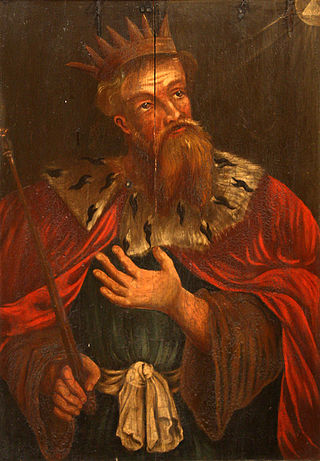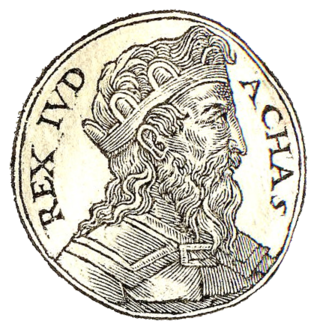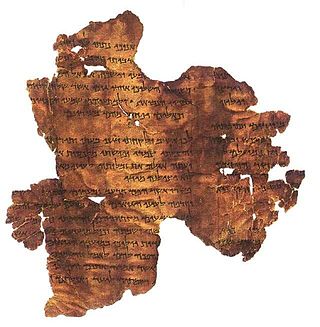Related Research Articles
The Book of Kings is a book in the Hebrew Bible, found as two books in the Old Testament of the Christian Bible. It concludes the Deuteronomistic history, a history of ancient Israel also including the books of Joshua, Judges, and Samuel.

Hezekiah, or Ezekias, was the son of Ahaz and the thirteenth king of Judah according to the Hebrew Bible.

Isaiah was the 8th-century BC Israelite prophet after whom the Book of Isaiah is named.

Ahaz an abbreviation of Jehoahaz II, "Yahweh has held" was the twelfth king of Judah, and the son and successor of Jotham. Ahaz was 20 when he became king of Judah and reigned for 16 years.

Immanuel or Emmanuel is a Hebrew name that appears in the Book of Isaiah (7:14) as a sign that God will protect the House of David.
"Maher-shalal-hash-baz" was the second prophetic name mentioned in Isaiah chapter 8–9.
Hephzibah or Hepzibah is a minor figure in the Books of Kings in the Hebrew Bible. She was the wife of Hezekiah, king of Judah, and the mother of Manasseh of Judah.
Isaiah 7:14 is a verse in the seventh chapter of the Book of Isaiah in which the prophet Isaiah, addressing king Ahaz of Judah, promises that God will destroy the king's enemies before a child born to an almah is weaned. According to most modern scholars, the Hebrew word עַלְמָה ‘almāh means a "young woman of childbearing age", but it was translated into Koine Greek in the pre-Christian Septuagint as παρθένος parthenos, meaning virgin, and was subsequently picked up by the gospel of Matthew and used as a messianic prophecy of the Virgin birth of Jesus. Isaiah 7:14 continues to be one of the most controversial Bible verses.
The male given name Zechariah is derived from the Hebrew זְכַרְיָה, meaning "The Lord has remembered." It has been translated into English in many variant forms and spellings, including Zachariah, Zacharias and Zachary.
The dual fulfilment of prophecy or dual fulfillment or dual prophecy or duality in prophecy or present and future application is the mainly Christian idea that some prophecies in the Bible have both a short-term and long-term fulfillment.

Hosea 1 is the first chapter of the Book of Hosea in the Hebrew Bible or the Old Testament of the Christian Bible. This book contains the prophecies attributed to the prophet Hosea, son of Beeri, and this chapter especially sets forth the spiritual whoredom of Israel by symbolical acts. It is a part of the Book of the Twelve Minor Prophets.
Isaiah 7 is the seventh chapter of the Book of Isaiah in the Hebrew Bible or the Old Testament of the Christian Bible. This book contains the prophecies attributed to the prophet Isaiah and is one of the Books of the Prophets.
Isaiah 30 is the thirtieth chapter of the Book of Isaiah in the Hebrew Bible or the Old Testament of the Christian Bible. This book contains the prophecies attributed to the prophet Isaiah, and is one of the Books of the Prophets. The Jerusalem Bible groups chapters 28-35 together as a collection of "poems on Israel and Judah". The Cambridge Bible for Schools and Colleges describes this chapter as "a series of Oracles dealing with the Egyptian Alliance and its consequences; the present state and future prospects of Israel, and the destruction of the Assyrians".
Isaiah 36 is the thirty-sixth chapter of the Book of Isaiah in the Hebrew Bible or the Old Testament of the Christian Bible. This book contains the prophecies attributed to the prophet Isaiah, and is one of the Books of the Prophets. The text, describing the invasion of the Assyrian king Sennacherib to the Kingdom of Judah under Hezekiah.

2 Kings 18 is the eighteenth chapter of the second part of the Books of Kings in the Hebrew Bible or the Second Book of Kings in the Old Testament of the Christian Bible. The book is a compilation of various annals recording the acts of the kings of Israel and Judah by a Deuteronomic compiler in the seventh century BCE, with a supplement added in the sixth century BCE. This chapter records the events during the reign of Hezekiah, the king of Judah, a part of the section comprising 2 Kings 18:1 to 20:21, with a parallel version in Isaiah 36–39.

2 Kings 19 is the nineteenth chapter of the second part of the Books of Kings in the Hebrew Bible or the Second Book of Kings in the Old Testament of the Christian Bible. The book is a compilation of various annals recording the acts of the kings of Israel and Judah by a Deuteronomic compiler in the seventh century BC, with a supplement added in the sixth century BC. This chapter records the invasion of Assyrian to Judah during the reign of Hezekiah, the king of Judah, a part of the section comprising 2 Kings 18:1 to 20:21, with a parallel version in Isaiah 36–39.

2 Kings 20 is the twentieth chapter of the second part of the Books of Kings in the Hebrew Bible or the Second Book of Kings in the Old Testament of the Christian Bible. The book is a compilation of various annals recording the acts of the kings of Israel and Judah by a Deuteronomic compiler in the seventh century BCE, with a supplement added in the sixth century BCE. This chapter records the events during the reign of Hezekiah and Manasseh, the kings of Judah.

2 Chronicles 32 is the thirty-second chapter of the Second Book of Chronicles in the Old Testament in the Christian Bible or of the second part of the Books of Chronicles in the Hebrew Bible. The book is compiled from older sources by an unknown person or group, designated by modern scholars as "the Chronicler", and had its final shape in late fifth or fourth century BCE. This chapter belongs to the section focusing on the kingdom of Judah until its destruction by the Babylonians under Nebuchadnezzar II and the beginning of restoration under Cyrus the Great of Persia. The focus of this chapter is the reign of Hezekiah, king of Judah.

2 Chronicles 29 is the twenty-ninth chapter of the Second Book of Chronicles the Old Testament in the Christian Bible or of the second part of the Books of Chronicles in the Hebrew Bible. The book is compiled from older sources by an unknown person or group, designated by modern scholars as "the Chronicler", and had the final shape established in late fifth or fourth century BCE. This chapter belongs to the section focusing on the kingdom of Judah until its destruction by the Babylonians under Nebuchadnezzar and the beginning of restoration under Cyrus the Great of Persia. The focus of this chapter is the reign of Hezekiah, king of Judah.

2 Kings 21 is the twenty-first chapter of the second part of the Books of Kings in the Hebrew Bible or the Second Book of Kings in the Old Testament of the Christian Bible. The book is a compilation of various annals recording the acts of the kings of Israel and Judah by a Deuteronomic compiler in the seventh century BCE, with a supplement added in the sixth century BCE. This chapter records the events during the reign of Manasseh and Amon, the kings of Judah.
References
- ↑ "Abijah". A Cyclopaedia of Female Biography: 2. 1857. Wikidata Q115281590.
- ↑ Whittaker, Harry (1988). Isaiah (PDF). Cannock, Staffordshire: Biblia Books.[ permanent dead link ]
- ↑ Hammershaimb, Erling (1949). "The Immanuel Sign". Studia Theologica. 3 (2): 124–42. doi:10.1080/00393384908599686.
- ↑ Lindblom, Johannes (1958). A study on the Immanuel section in Isaiah: Isa. vii,1–ix,6. Lund.